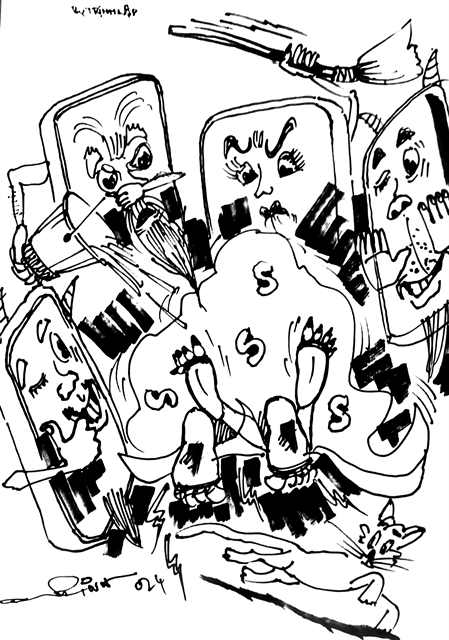 Society
Society

 |
| Illustration image by Trịnh Lập |
Khánh Dương
The global entertainment industry has recently been shaken by the accusations made against rapper and music mogul P. Diddy, who is facing numerous sexual assault lawsuits from women.
In Việt Nam, a Gen Z rapper has been in the spotlight for several days after making a controversial statement implying that “no need to go to school but you can still become famous” along with instances of sexual harassment on the social network.
Negav, the rapper's stage name, a rising star based on his appearance on a recent TV show, was also found to have made other controversial comments on celebrities’ Facebook posts some years ago, when he was less well-known.
Netizens found the comments to be vulgar, disappointing many of his followers.
Not stopping there, Negav is also the administrator of 3,000-member Facebook group named 'Wet tissues', with many posts containing offensive, even sexually harassing content about young girls and celebrities since 2020.
The most active Facebook user in the group was Negav himself.
A lot of the group’s members – including music idols from the younger generation – reacted to his posts, left comments on them, and made jokes about the obscene and sexually suggestive stories.
Negav's fans – most of whom are in the same generation as him – consider the ‘jokes’ normal, since they still frequently hear and even use the 'jokes' in regular conversation.
Fans continue to stand with Negav and offer him support and protection. They show sympathy by saying that it was just a mistake due to his youth.
Lawyer Diệp Năng Bình from the HCM City Bar Association said Negav's comments and posts are considered sexual harassment on the Internet and are against the law.
The lawyer defined 'cyber sexual harassment' as sexual activity on any digital platform that negatively affects the victims.
In fact, inappropriate comments are just one aspect of sexual harassment on social media. There are a lot of other actions that fall under online sexual harassment as well, like sending filthy images and videos, modifying other people's photos with offensive information or sending spam messages.
Many victims receive messages with crude and derogatory language asking them to go out for dinner or to get to know one another.
Nguyễn Vân Anh, a Vietnamese expert on gender and director of the Centre for Studies and Applied Sciences in Gender, Family, Women and Adolescents, said sexual harassment on the Internet is a problem today not only in Việt Nam but also in many other countries.
"A lot of individuals confuse sexual harassment and jokes. They disregard the fact that it is against the law when they post and comment in offensive language about gender and sex, and consider it to be a harmless joke,” she told Việt Nam News.
According to the expert, the line between joking and harassment is quite thin and is easily confused, depending on many factors and contexts. Consent is the key factor in differentiating these two concepts.
"Your humorous comments and posts in a group must be accepted by members and not cause discomfort to anyone. It is considered harassment if even one individual is not in agreement. The content of the posts must not be offensive or sexually suggestive,” she said.
"The act of members in a closed group liking posts and making sensitive and rude comments is also considered complicit in harassment," she said.
We can observe in our daily life that jokes with sexually explicit vocabulary are common in daily speech, both online and in person. They are typically regarded as jokes in public settings like offices and schools.
A friend of mine said there is a man at her workplace who frequently makes sexual jokes with everyone by using metaphorical language.
“That’s like his style of joking. Although the funny stories are not badly intentioned and do not target anyone sexually, I myself feel annoyed,” she said.
How would you respond if you were in that situation?
Would you laugh along with the jokes, be quiet, or both?
In that instance, it appears that at least one colleague is not in agreement with the group's jokes, making it sexual harassment.
Many cross the boundary between jokes and verbal sexual harassment without being aware that it is an offence.
Lawyer Nguyễn Tiến Hải Dương from the HCM City Bar Association said joining groups with sensitive content shows that some artists are not aware that those behaviours can lead to serious legal and social consequences.
Negav must pay a heavy price for his mistakes.
A number of brands that he represents have cancelled their contracts with him, and the rapper is also postponing his entire performance schedule.
Young singers, who are idols to thousands or perhaps millions of young people, can learn a valuable lesson from the Negav case: exercise caution when making public comments online.
However, this isn't just the case for famous people.
It instills in every one of us the value of learning to discern between verbal sexual harassment and jokes.
We should not become enablers of offensive actions, but speak out against harassment.
If done by one person, then by two, three and so on, it will start a positive trend in our community. — VNS




